As electric vehicles (EVs) become more popular, the installation of EV charging stations have also become a necessary upgrade.
Hiring a licensed electrician with experience in EV charger installation is essential. But how much should you expect to pay?
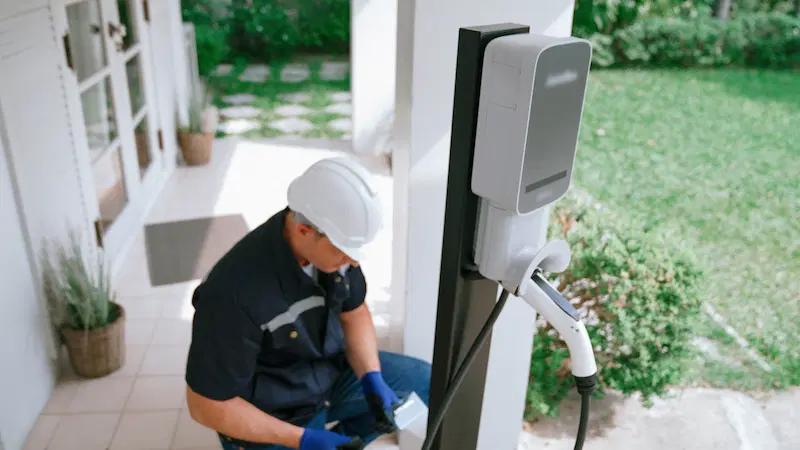
We can help you with two things: provide you with the information you need to efficiently plan for an EV charging installation, and find the right electrician with the best price.
Get quick answers to your questions regarding this project by reading the rest of this article. At your convenience, just fill out the short online form on this page to compare FREE quotes!
Is it worth installing an EV charging station?
Installing an EV charger at home is the most practical and inexpensive way to keep your electric vehicle running. More than 80% of EV owners have a charging station at home.
You can just plug in your vehicle overnight so you can be ready to head out in the morning.
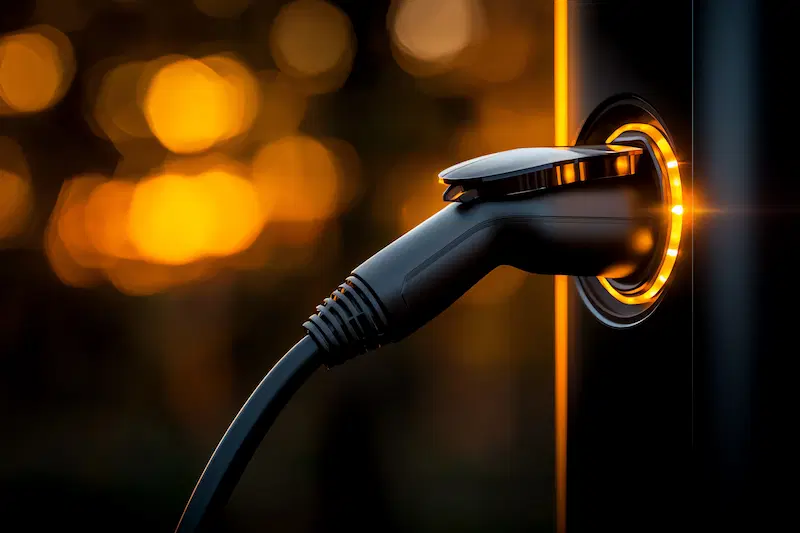
The total cost to install an EV charger varies based on factors such as:
- The cost of the charger unit you choose (brand and model)
- The electrical capacity of your home
- Permits
- Labour
Here is a brief summary of the benefits of installing a Home EV Charger
- Convenience: No need to go to public charging stations. You can charge your EV at home overnight and have a full battery in the morning.
- Save Time: Level 2 home chargers work faster than Level 1 chargers, and can also charge your EV up to 7 times faster.
- Save Money: Charging at home during off-peak hours is cheaper than using public charging stations.
If you are interested in installing an EV charging station, you must know the options available.
Licensed electricians know and understand the various EV charging units available and can give you good recommendations based on your needs.
How Much Does it Cost to Charge an EV at Home in Canada?
One of the interesting questions you need to consider is the cost of charging your EV at home.
Electricity rates vary across provinces, influencing the cost of charging your EV:
- Ontario: Approximately $0.087 per kWh during off-peak hours.
- Quebec: Around $0.073 per kWh, making it one of the most affordable provinces for EV charging.
- Alberta: Rates can be higher, averaging $0.22 per kWh
Cost per 100 km
The cost to drive 100 kilometres varies based on your EV’s efficiency and the local electricity rates:
- Efficient EVs (e.g., Tesla Model 3): Approximately $1.75 to $2.36 per 100 km.
- Average EVs: Around $4 per 100 km
Monthly and Annual Costs
Based on the assumption that you drive an annual driving distance of 20,000 km:
- Monthly: Approximately $50 to $60 added to your electricity bill.
- Annually: Between $600 and $720, depending on your EV model and driving habits
Comparison of Charging Cost: Home vs. Public Stations
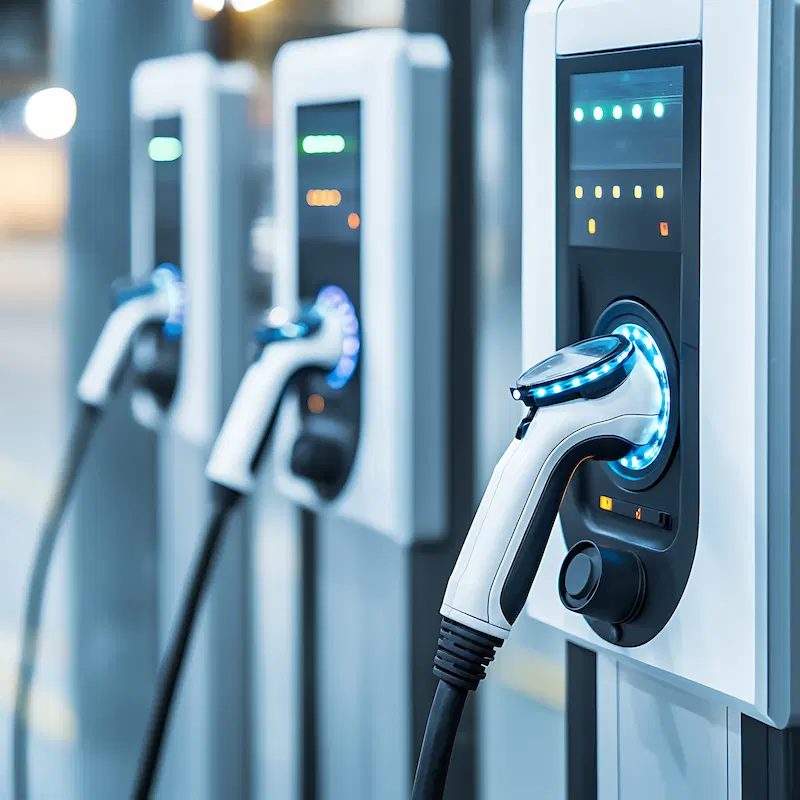
To help you further assess if investing in the installation of a home EV charger makes sense, refer to the table of comparison below.
Method of Charging | Cost per kWh in CAD | Description |
Public level 2 Charging | $0.15-$0.25 | Typically with hourly rates, commonly found in urban areas |
DC Fast Charging | $0.30-$0.60 | Quick charging, more expensive per session |
Home Charging | $0.07-$0.22 | Cheapest method but varies per province |
You can save money by charging your EV at home with an EV home charger installed by an electrician.
Charging your EV at home in Canada is convenient and cost-effective, especially if you use your city’s incentives and charge during off-peak times.
Make your life easier and enjoy driving your EV daily without hassle! Find the best electrician for installing the right EV home charger for your needs.
Popular Home EV Charging Units in Canada
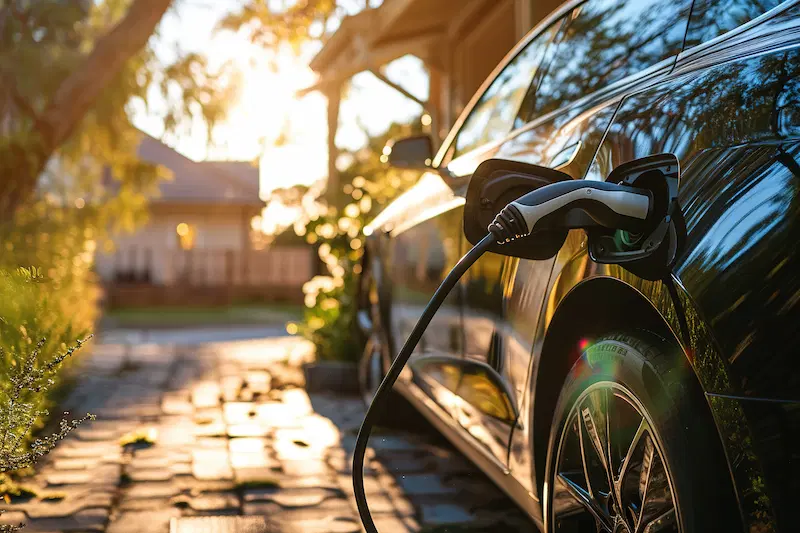
When choosing a home EV charger, it’s important to get a unit that’s reliable, compatible with your vehicle, and certified for use in Canada.
Here are some of the most popular models trusted by Canadian EV owners:
ChargePoint Home Flex
- Type: Level 2
- Speed: Up to 50 amps (adds up to 58 km of range per hour)
- Features: Wi-Fi enabled, app control, flexible amperage settings
- Ideal for: EV owners who want a smart charger with scheduling and remote access.
- Average Cost (CAD): $900-$1,200
Grizzl-E Classic
- Type: Level 2
- Speed: Up to 40 amps
- Features: Durable, weatherproof, Canada-made
- Ideal for: Homeowners looking for a simple unit. This model is suitable to the harsh Canadian climate.
- Average Cost (CAD): $650-$800
Tesla Wall Connector (Gen 3)
- Type: Level 2
- Speed: Up to 48 amps
- Features: Designed for Tesla vehicles but can work with other EVs using an adapter
- Ideal for: Tesla EV owners who want to charge conveniently at home.
- Average Cost (CAD): $750-$950
Flo Home X5
- Type: Level 2
- Speed: 30 amps
- Features: Smart charger, built tough for Canadian weather, Wi-Fi connectivity
- Ideal for: Customers who prefer a sleek but professional-grade charging unit.
- Average Cost (CAD): $1,000-$1,300
JuiceBox 40
- Type: Level 2
- Speed: 40 amps
- Features: Wi-Fi connected, app control, voice control with Alexa
- Ideal for: Tech-savvy people who want full control and energy monitoring
- Average Cost (CAD): $850-$1,100
The installation costs (fees charged by licensed electricians) are billed separately; these fees range from $500 to $2,000, depending on your home’s electrical wiring system.
Ontario, Quebec, and British Columbia have provincial rebates which can help you save $250 to $700, depending on your location.
Would you like to get professional recommendations for your home EV charging station together with quotes for installation by our partner electricians?
Please fill out the short online form on this page now and receive FREE and NO-OBLIGATION offers to save time and money.
Important Tips to Consider when Choosing an EV Charger
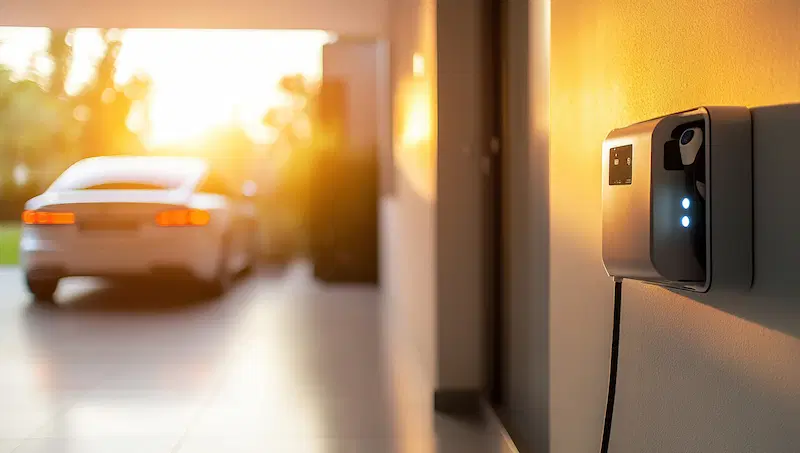
Price is not the only factor to consider when choosing an EV charger for your home. This is an investment that will affect your daily life.
Consider the following when choosing the EV charger to install in your home:
- Check Certification: Look for CSA, UL, or ETL certification to ensure that the charger unit meets Canadian safety standards.
- Smart Features: If you want to monitor energy use or set charging schedules, choose a Wi-Fi enabled unit unless you feel you don’t need these features.
- Outdoor vs Indoor Installation: If for outdoor installation, make sure to get a weather-resistant unit (NEMA 4 rated).
- Amperage Needs: Higher amperage chargers offer faster charging but require compatible home wiring.
Why Consult an Electrician before installing an EV Charger at Home
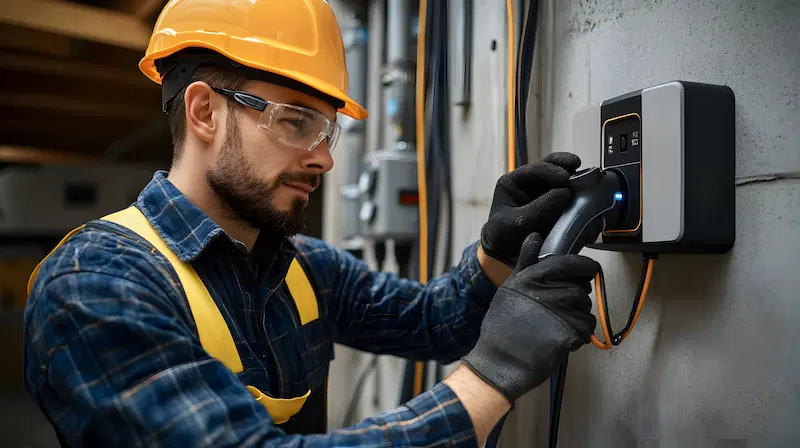
Installing a home EV charger isn’t just about plugging it in. Oftentimes, it will require electrical work to be done to ensure safety, code compliance, and efficiency.
Here’s why consulting a licensed electrician is critical:
1.Electrical Load Assessment
- An electrician will check if the home’s existing electrical panel can handle the additional load of a Level 2 charger.
- He can upgrade the panel if it is outdated or full to prevent potential fire risks and overloading.
2.Proper Circuit Installation
- EV chargers require dedicated circuits (usually 240V).
- Licensed electricians make sure to have the correct wiring, amperage, and breaker installation to comply with existing codes.
3.Permit and Inspection Compliance
- Many municipalities in Canada require permits for EV charger installations.
- Hiring an electrician ensures the work is done legally and will pass inspection — important if you plan to sell your home in the future.
4.Safety and Warranty Protection
- Improper installation can render the charger’s warranty and insurance coverage void.
- Electricians follow safety and code compliance standards to protect your home.
5.Maximizing Rebates and Incentives
- Some provincial programs for EV charger rebates such as in Ontario and Quebec require proof that the installation was done by a licensed electrician.
Always hire a qualified electrician to install a home EV charger or make electrical upgrades. It’s for your safety, is mandatory under the law, and can even save you thousands of dollars over the long term.
Checklist of Questions to Ask an Electrician before installing an EV charger
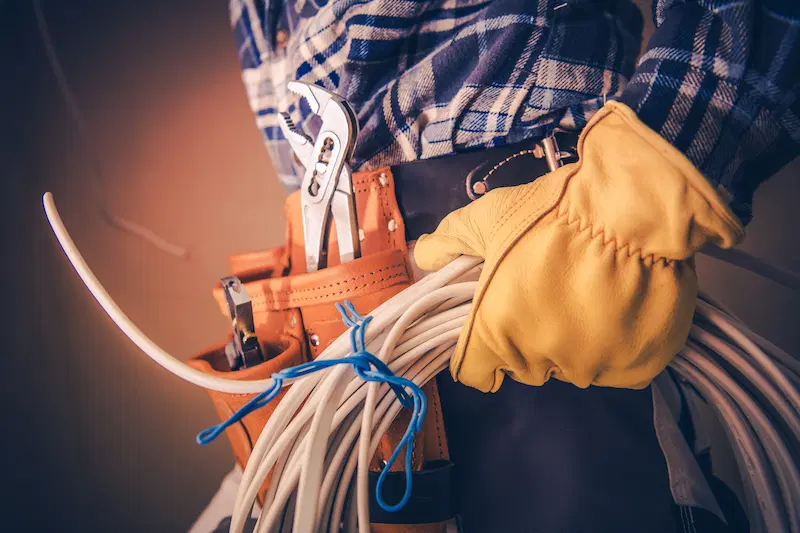
It can be easy to find electricians who can install an EV charger in your home. But before you hire one, you should do some research to make the best decisions.
Below are some questions you should ask an electrician before installing a home EV charger.
1.Are you licensed and insured to work in my province? Always confirm their credentials to ensure your installation is legal and protected.
2.Have you installed EV chargers before? A solid experience with EV-specific installations will help to ensure fast, smooth, and efficient installation.
3.Do I need an electrical panel upgrade? If your current panel is outdated or full, you may need a panel upgrade.
4.Can you help me get the necessary permits and inspections? A good electrician can help you obtain a permit or guide you.
5.What is the total cost estimate for labour and materials? Get a detailed quote upfront so you don’t get any nasty surprises.
6.Do you know if I qualify for any rebates or grants? Electricians are familiar with local rebate programs and can guide you.
7.How long will the installation take? Usually, home EV charger installations take 2–5 hours unless further electrical work or upgrades are necessary.
8.Will you test the charger and teach me how to use it? Good electricians will test your charger and explain how to operate it.
Get started today in finding a good electrician near you by comparing free quotes.
Request competitive quotes from our partners by filling out the form on this page.
When is it not advisable to install a home EV charger?
We have explained the benefits of installing a home EV charger – convenience, practicality, and savings. For almost 80% of EV owners, having an EV charger at home is as essential as charging mobile phones at home.
But when is it not advisable to have a home EV charger installed?
- You just drive the EV occasionally: If you just drive a few kilometres a week, a level 1 charger (wall socket charger) may be enough.
- You are renting your house or plan to move soon: If you don’t own the home or you could move out soon, installing a home charger may not be ideal.
- Limited Electrical Capacity: If the home’s electrical system is outdated, you would have to spend more on upgrades.
Most EV owners prefer to install a Level 2 home charger for long-term savings, convenience, and increased home value.
To check if this is also the right step for you, evaluate your driving habits, the electrical capacity of the home, your housing plans for the future, and your budget.
Will an EV Charger Installation Increase Home Value?
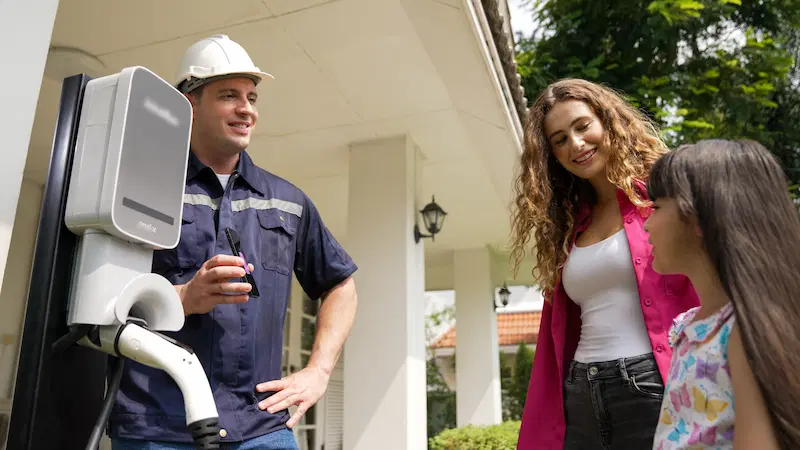
Many homebuyers would prefer a home with a built-in charging station. As priority for the use of zero-transmission vehicles grows, more homebuyers will consider a home EV charger as essential.
Aside from the many benefits you can get from home charging, your home value will also increase if you decide to sell your house in the future.
Connect with Licensed Electricians for Home EV Charger Installation
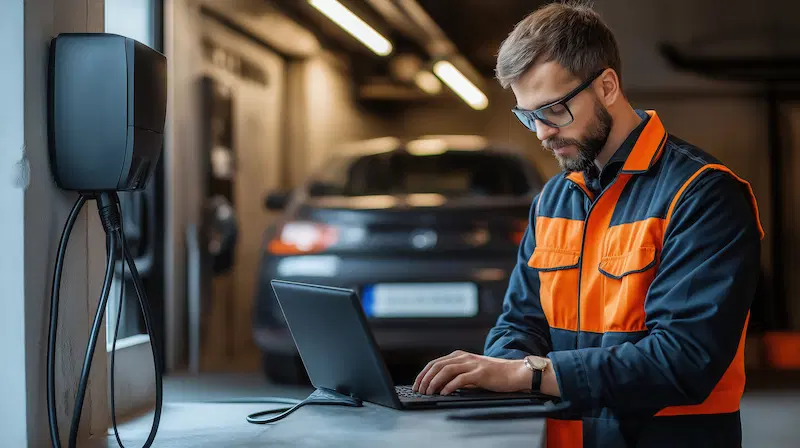
Whether you are driving a Tesla, Ford F-150, or Hyundai Kona, installing a home EV charging station is a convenient and financially savvy step.
Enjoy the ownership of an EV to the maximum degree with the ability to charge your vehicle at home.
Find a licensed electrician in your area who can provide you with good advice on the right unit that suits your needs and install it safely and properly!
Compare multiple quotes from top electricians for Home EV charger installation using just one short online form!




